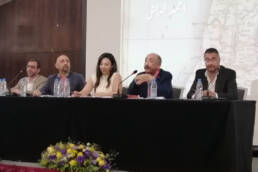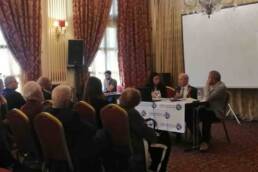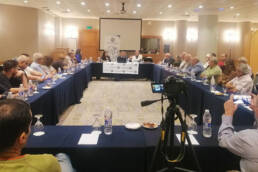The Center for Arab Unity Studies held a seminar on the “Beirut Explosion and its Geopolitical Implications” via the Zoom app, on Wednesday, September 9, 2020. The seminar was presented by the Center’s General Director, Luna Abu Swaireh, and moderated by Faris Abi Saab, its editor-in-chief, with the participation of a group of experts in Politics, economics and geology, including the former Minister of Finance, the economist George Corm, the economist Kamal Hamdan, the university professor, writer Hussam Matar, the university professor, writer Hisham Safi El-Din, the economist university professor Ziad Hafez, the academic researcher Aqeel Mahfoud, and other specialists and academics.
The dialogue discussed the political and economic context in which the explosion happened, that coincided with an unprecedented political and financial crisis and external pressures, and “strengthened internal divisions and increased American pressure”, as Abi Saab said. The participants discussed the flow of foreign diplomatic and military delegations to Lebanon. More than one intervention focused on the prominent French role that followed the explosion, and was manifested in two successive visits of French President Emmanuel Macron in less than a month.
The economist, George Corm, spoke about a long history of wrong and “wasteful” economic policies in Lebanon for the last 30 years. Therefore, he called for focusing on the issue of the “costs” of reconstruction. He also ruled out the option of “Heading East”, wondering about the ability of Lebanon to preserve its “relative” independence in front of all current challenges and American-French pressures.
The economist Kamal Hamdan also talked about the cost of the damage caused by the explosion, which ranges from 6 billion and 600 million dollars as low estimates and 8 billion and 100 million according to World Bank estimates. Hamdan considered that the damage of about 6000 buildings and dwellings, including 600 heritage buildings, was the most dangerous. He explained that most of the damaged housing belongs to old tenants that are middle-income groups or below, and since the Lebanese law requires the tenant and the owner to share the cost of the restoration, the delay of the restoration will force families to seek alternative housing, which will “change the social fabric” of these damaged areas of Beirut. Hamdan stressed that “the inability of the political class to come to terms with reforms will delay external support and will reinforce the chaos scenario”. He warned of “Western sentiments” towards Lebanon that want to “push Lebanon towards the American-Israeli axis expressed in the Deal of the Century”, Under the pretext of helping it.
The university professor and writer Hussam Matar considered that the option of “heading east” had receded and that was evident after the explosion because “the Chinese themselves are not ready to come to Lebanon,” as he said, explaining that they do not want a clash with the Europeans or the Americans, since the benefits from Lebanon are minimal. He added “they do not win the Lebanese consensus, and they do not provide direct financial support, which Lebanon needs”. On the other hand, Matar considered that the explosion frightened the Americans and the French from losing control due to the rapid collapse of the Lebanese situation, which prompted them to “develop the Western approach in Lebanon” and replace the option of sanctions against “the resistance” with the idea of reforms in exchange for preventing collapse. In his opinion, the reforms include “sovereign issues such as the defense strategy and the regional role of Hezbollah, controlling the crossings and borders, and the decision of peace and war …”, adding ” whoever tries to obstruct dialogue in this will be presented to the Lebanese people as responsible for the collapse … and within a few months we will start hearing the terms to rescue Lebanon … and that is also related to the identity of the forthcoming US president”, he said.
The university professor and writer Hisham Safi Al-Din summarized the scene as “two major challenges in the region, which are the tyrannical and corrupt regimes on one hand, and the colonial Zionist entity on the other hand,” asking, “What is the alternative project?”
The expert on geological and climate affairs, Ibrahim Shredi, spoke about the effect of the liberated energy from the Beirut explosion, which extended over a diameter of about 220 km to northern occupied Palestine, southwestern Syria and northern Jordan, reaching the capital Amman, which led to geological repercussions on the whole region of the Arab East, stressing that the sea absorbed a large part of this energy or else it would have destroyed all of Beirut, adding that the force of the quake led to tectonic activity in Yamouna’s Earthquake faults. Shredi also talked about the impact of the explosion on the climate due to the cloud that was formed from Ammonium Nitrate, which will lead to acid rain, as well as extremes in rain and heat in the upcoming Autumn and Winter, inferring to the heat wave that hit the Arab East recently, which is the longest in a hundred years.
The seminar was interspersed with additional interventions from specialists, and written comments and questions from viewers. It was broadcast live on the Zoom application and on the public page of the Center for Arab Unity Studies on Facebook, and will be published later in the Arab Future magazine.
You can watch the full panel discussion here:
مركز دراسات الوحدة العربية
فكرة تأسيس مركز للدراسات من جانب نخبة واسعة من المثقفين العرب في سبعينيات القرن الماضي كمشروع فكري وبحثي متخصص في قضايا الوحدة العربية
We appreciate your support
SUPPORT THE CENTRE FOR ARAB UNITY STUDIES
The Centre is reaching out for its friends and readers for support, whether by ordering our publications and paying for them in hard currency, or through donations. The Centre welcomes any support to boost its resiliency, to ensure its survival, the continuation of its legacy and its commitment to tackle issues facing the Arabs and the Arab world.



